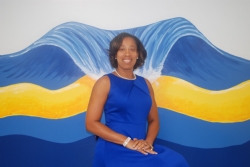After calling for a moratorium on new charter schools, the NAACP started a seven-city fact-finding tour that stops in Orlando this afternoon.
Charter school advocates plan to make their presence known. Some, like Donyale Ferguson McGhee, the principal of Somerset Preperatory Academy North Lauderdale, say they weren’t given a chance to formally testify, but they intend to offer public comments sending a message: “We are making a difference in lives of children.”

The NAACP approved its resolution last year, despite a full-court press by charter school supporters. Leaders of the civil rights organization say they’re not all-out anti-charter, but they want to halt the growth of charters while they look into concerns from segregation to student discipline.
McGhee, however, said that would deny some families the chance to enroll their children in schools that might work for them.
“I think that it works, and I think that we need to make sure that we give every parent a choice of whether or not they want their student to go to a charter school,” she said.
Her school is part of a vast network operated by the management company Academica. More than 95 percent of its students are low-income, and more than 95 percent are children of color. The past two years, it’s received C grades from the state for academic performance. Most importantly to McGhee, it has a 96.4 percent graduation rate.
“A lot of our kids told me in their personal testimony that they didn’t know how they ever would have been able to go to college,” she said.
Last night, at a forum hosted by Johns Hopkins University, Hilary Shelton, the head of the NAACP’s Washington bureau, said the organization did not want to shut down existing charters.
“We have to pause for a minute,” he said. “We want to make sure those kids have everything they need to be successful.”
Shelton said the goal of the moratorium, and the series of hearings around the country is to come up with a “minimum standard that’s shared throughout the public school system,” for traditional and charter schools alike, that would govern everything from teacher qualifications to class sizes.
Many education reformers eschew such “input”-based measures of school quality, arguing student outcomes matter more.
Gerard Robinson, a fellow at the American Enterprise Institute, said he has deep admiration for the civil rights organization. Without its decades of advocacy, he said he would never have been able to lead state education departments in Florida and Virginia. But at Johns Hopkins, he said he was skeptical the NAACP would be open to softening its stance on charters, which has hardened over two decades. (He discussed some of these issues on a recent podcast.)
Last year’s resolution, Robinson said, was “a clarification for me, not a revelation.”
McGhee said she’s coming to the hearing armed with letters from students. She has worked in charter schools for 16 years and is going into her third as a principal. She said she has seen how having a choice of where they go to school can make a difference in students’ lives.
“They felt that their voices were heard. They felt that they had personalized attention. They felt that the teachers knew them holistically. They felt that they weren’t just a number,” she said. “Because they weren’t just a number, they felt that they could be successful, and they could go back to the community and impact the community.”
Charter advocates are commenting on the hearing — which runs from 2 p.m. to 7 p.m. today — using the Twitter hashtag #WakeUpNAACP.


